|
|
|
Sort Order |
|
|
|
Items / Page
|
|
|
|
|
|
|
| Srl | Item |
| 1 |
ID:
092503
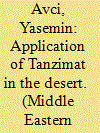

|
|
|
|
|
| Publication |
2009.
|
| Summary/Abstract |
The second half of the nineteenth century was a period when the Ottoman government's centralization efforts gained momentum. In Southern Palestine, this entailed a struggle for central government to gain the upper hand over the Bedouin tribes. In the 1860s, the Ottoman government was still using military power to end the internal strife between the Bedouin tribes. However, from the 1890s on, the government began to use sophisticated means and tactics in order to secure control and encourage the integration of the Bedouin element in the empire. The creation of a new town, namely Beersheba, the changing apparatus of administration, the construction of public buildings in desert, all meant that the government attempted to penetrate the nomad's way of life. In this study the main emphasis will be given to describing the role of the state in forming and changing the tribal institutions.
|
|
|
|
|
|
|
|
|
|
|
|
|
|
|
|
| 2 |
ID:
186580
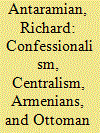

|
|
|
|
|
| Summary/Abstract |
This article argues that non-Muslim engagement with 19th-century Ottoman reform should be understood in the context of a confessionalized politics that originally fostered partnerships of governance in the 18th century. The confessionalization of non-Muslim communities in the 18th century, which resulted in the political empowerment of Istanbul-based ethnarchs, promoted the establishment of robust communal boundaries that were more legible to the central state. These arrangements also made non-Muslim communities such as the Armenians partners in governance, responsible for supporting the state's effort to maintain its place atop a contentious imperial politics. The Tanzimat reforms, which reorganized non-Muslim communities and devolved some power from the clergy to the laity, were not a novelty, but instead a renegotiation of non-Muslims’ roles in the centralization of state. Rather than embrace secularized identities, non-Muslims enthusiastically used their own religious institutions to promote state centralization. In the process, they reconfigured relations of power in the region that left non-Muslims structurally marginalized.
|
|
|
|
|
|
|
|
|
|
|
|
|
|
|
|
| 3 |
ID:
174165
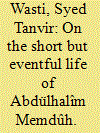

|
|
|
|
|
| Summary/Abstract |
Reforms introduced in 1839 (known as the Tanzimat) which were intended to modernize the Ottoman political and administrative structure, led inevitably to movements which introduced new literary ideas into the Ottoman cultural sphere. One of the first writers who wished to see Ottoman literature catch up with developments in Europe was Abdülhalîm Memdûh (1866 – 1905). His contributions covered the areas of poetry, prose, drama, journalism and political activism. Memdûh was not content with using classical chronicles; he published at the age of 22 the very first History of Ottoman Literature in Turkish, which served as the model for subsequent literary histories. Later, in his short life, he collaborated with Edmond Fazy, a Swiss writer, to publish a book in Paris titled Anthologie de l’amour turc, which contains Turkish love poems in French translation for the first time. This article evaluates the contributions of Abdülhalîm Memdûh in order to give him a place among the pioneers of 20th century Turkish literature.
|
|
|
|
|
|
|
|
|
|
|
|
|
|
|
|
| 4 |
ID:
155940
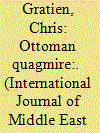

|
|
|
|
|
| Summary/Abstract |
During the late Ottoman period, a large influx of migrants and the expansion of cultivation created opportunities for new settlements in the countryside of Anatolia, Greater Syria, and Iraq. However, settlement often brought misery to newcomers in the form of malaria, especially when it occurred in the lowlands of the Mediterranean. This article traces the contours of the encounter with malaria that arose out of settlement, offering an overview of how Ottoman state and society confronted the conundrum of the swamp and examining the impact of this confrontation on local political economies. It demonstrates that swamps and malaria were a significant concern for late Ottoman state and society, and that policies adopted to address malaria sometimes facilitated the creation of large estates in the countryside of the Mediterranean littoral.
|
|
|
|
|
|
|
|
|
|
|
|
|
|
|
|
| 5 |
ID:
172451


|
|
|
|
|
| Summary/Abstract |
The 1917 promulgation of a new Ottoman family law is recognized as a landmark moment in the history of Islamic law by scholars of women and gender in the Middle East. Yet the significance of the 1917 law in the struggle over religious jurisdiction, political power, and Ottoman sovereignty has been overlooked in the scholarship on both Ottoman legal reform and World War 1. Drawing on Ottoman Turkish, German, French, and English sources linking internal interpretations of the law and external reactions to its passage, we reinterpret adoption of the family law as a key moment in the geopolitics of World War 1. We demonstrate that passage of the law was a critical turning point in the wartime process of abrogating the capitulations and eliminating the last vestiges of legal extraterritoriality in the Ottoman Empire. The law is situated in its wartime political context and the geopolitical milieu of larger Europe to demonstrate that, although short-lived, the 1917 family law was a centerpiece of the wartime struggle to define extraterritorial rights of the Ottoman Empire, the Great Powers, and their protégés within the empire.
|
|
|
|
|
|
|
|
|
|
|
|
|
|
|
|
| 6 |
ID:
175801


|
|
|
|
|
| Summary/Abstract |
The present article is a study of provincial administration in the nineteenth-century Ottoman Albania and Kurdistan. It examines the transformation of provincial administration in Dibra and Hazro after two towns’ hereditary rulers were exiled. Focusing on the employment patterns of the notables in exile as well as the ones who occupied the posts in the absence of the former, this study challenges the binary framework mostly employed in conceptualizing the making of the modern Ottoman state. Particularly, the employment of the notables exiled to the distant parts of the empire necessitates a revision in the presumptions about the origins of appointed Ottoman officials. By focusing on the partnership operating by means of employment, this study argues that the making of Ottoman state follows a trajectory of flexible centralization based on the partnership between the government and notables, terms of which were constantly negotiated.
|
|
|
|
|
|
|
|
|
|
|
|
|
|
|
|
| 7 |
ID:
099830


|
|
|
| 8 |
ID:
164902
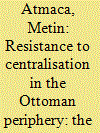

|
|
|
|
|
| Summary/Abstract |
Modern Kurdish historiography, which examines resistance to provincial centralisation in Ottoman Kurdistan, focuses largely on Bedir Khan’s Bohtan emirate and his revolt in the 1840s, while ignoring the rest of the other Kurdish emirates such as Baban emirate. While both states, Qajar Iran and Ottoman Empire, were endeavouring to solve their conflicts in the 1840s (a process which culminated in the treaty of Erzurum in 1847) the future of the Baban emirate and its territories emerged as one of the major issues during the course of negotiations. The Baban emirate was the last emirate to give up its struggle against the Sublime Porte’s centralisation reforms. The legacy of the Kurdish emirates is important to understand better the relations between the centre of the Ottoman Empire and its eastern periphery, a much less studied subject in Ottoman historiography. This article will highlight the impact of the centralisation policies in Kurdistan, more specifically on territories of the Bohtan and Baban emirates. It will be demonstrated that the changes wrought by the Tanzimat reforms were partially successful in transforming the Kurdish notables, who later became a part of the state bureaucracy. However, the reform-minded officials, who were appointed after the Kurdish emirs were removed from the region, failed to persuade the locals in favour of the new administration thus transforming their lives.
|
|
|
|
|
|
|
|
|
|
|
|
|
|
|
|
|
|
|
|
|